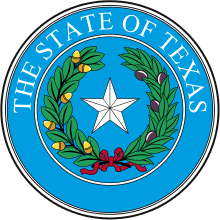Vince's Bridge
Part of a series on the |
||||||||||||||
|---|---|---|---|---|---|---|---|---|---|---|---|---|---|---|
| History of Texas | ||||||||||||||
 | ||||||||||||||
| Timeline | ||||||||||||||
|
||||||||||||||
|
| ||||||||||||||
Vince's Bridge was a wooden bridge constructed by Allen Vince over Sims Bayou near Harrisburg, Texas. Its destruction by Texas armed forces played a critical role during the April 1836 Battle of San Jacinto in the decisive defeat of the Mexican army, which effectively ended the Texas Revolution.[1] Located on the most likely possible route of escape for Antonio López de Santa Anna and his column of the Mexican army, the burning of Vince's Bridge helped prevent his soldiers from reaching the safety of nearby reinforcements.[1]
History
The bridge was built and owned by a local pioneer named Allen Vince.[2] It was clear from prolonged spring rains. John Coker, a private in Sam Houston's Texas cavalry, first advanced the idea as he was talking with a group of his comrades about possible reinforcements reaching the enemy camp. He remarked that the destruction of the bridge over Vince's Bayou, some eight miles (13 km) west of the Texans' camp, would distract the Mexicans. All agreed that the idea was a wise one, and scout Deaf Smith was requested to place the idea before General Sam Houston.[1][3]
General Houston thought the suggestion was a good one and quickly ordered Deaf Smith to select several trusted cavalrymen, evade the enemy, and proceed to the crossing and destroy the bridge. The structure was not chopped down, as mistakenly stated by some historians, but was instead burned.[1] A larger force would have been required to cut down the massive and lengthy structure in so short a time. After the successful destruction of the bridge was announced to the Texans just before the battle, they knew that there was no chance for retreat for either army. They rushed forward, and in 18 minutes, completely routed the panic-stricken Mexicans.[2]
Santa Anna, in his attempted hasty escape from the encircling Texans, soon came to the burned bridge, which he thought was on the headwaters of Buffalo Bayou and his private secretary believed was on the Brazos River. The general was later captured after being significantly delayed by the destroyed structure[2][4]
Tactically, the destruction of Vince's Bridge prevented the escape of nearly all of the Mexican survivors. From a strategic perspective, as couriers and fleeing soldiers could no longer readily cross the rain-swollen bayou, it kept news of Santa Anna's defeat from quickly reaching General Vicente Filisola, his second-in-command, and also from General José de Urrea, who had a division on the west bank of the Brazos River. Both columns were in a position to have aided Santa Anna or to have attacked Houston's army, which was still outnumbered by the remaining Mexican forces.[2]
See also
|
References
- 1 2 3 4 "Y.P. Alsbury letter" Texas Archives
- 1 2 3 4 "Battle of San Jacinto" Texas Historical Commission historical marker.
- ↑ There is a mistaken belief that Sam Houston personally formulated and suggested the destruction of Vince's Bridge. However, sworn testimony by Young Perry Alsbury contradicts this common misconception. "Y.P. Alsbury letter" Texas Archives.
- ↑ "John Coker" Texas Historical Commission historical marker.
External links
- Young Perry Alsbury Letter
- Santa Anna's Letter
- Santa Anna's Account of the Battle
- Account of the battle by Creed Taylor
- San Jacinto
- Vince's Bridge
- San Jacinto
- Historical Marker
